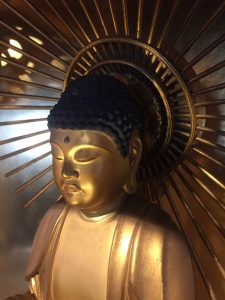
By Rev. Marcos Sawada
As a Jodo Shinshu Buddhist minister, would people criticize me if I practiced meditation? Even within our Higashi Honganji denomination, I think most teachers and followers may feel meditation is a “self-power” approach to enlightenment and therefore destined to fail.
According to a famous yoga master, Swami Rama, meditation (Sanskrit:dhyana) is a precise technique for calming the mind and attaining a consciousness totally different from a normal waking state. Through meditation, a person may gain insight into various aspects of the self, ultimately experiencing the center of consciousness. Meditation follows a particular order, has definite principles, and produces verifiable results.
In meditation, the mind is clear, relaxed, and inwardly focused. When meditating, a person is fully awake and alert, but one’s mind is not focused on the external world or on activities in one’s surroundings. Meditation requires an inner state that’s focused and still, so the mind becomes silent. As distractions fade, the level of meditation deepens. In this way, one becomes conscious of the unconscious.
The purpose of meditation is transforming the mind by transcending all discriminations, attachments, and bondage to ego and desires. Meditation returns one to the self through deep self-examination of body and mind, raising awareness of one’s actions and emotions.
When I do quiet sitting meditation (Japanese: seiza), I try to focus my mind on breathing in-and-out. All things constantly come and go, so sometimes certain thoughts leave my mind when other thoughts come in. When I finally feel calm and quiet, I experience a pleasant sensation. Through meditation, I feel my body is being nourished.
Throughout Buddhism’s 2,600-year history, the practice of meditation has evolved into various forms. For example, in the Theravada tradition of Southeast Asia, there are Vipassana and Samatha practice; in East Asia, there’s Ch’an in China, Son in Korea and Zen in Japan. In Tibet, there is Tantric meditation.
In Jodo Shinshu Buddhism, we can say our practice is Nenbutsu, reciting the name of Amida Buddha. In reciting the name, a moment of awareness comes to us. To me, this is an instant form of meditation that allows us to truly hear the dharma, the Buddhist teachings. Hearing the Dharma is possible with a pure and deeply entrusting mind (Japanese: shinjin). This hearing is made possible by a power beyond self, or Other Power, and not by self-power.
Judgements of right and wrong are the working of an egotistical-dualistic mind. As a seeker, I only can live moment-to-moment. All things happening at this moment have innumerable causes and conditions, of which I have no control. In trying to see this truth, I may reflect and try to understand why I react in certain ways. There’s no assurance I won’t act similarly in the future.
Shakyamuni Buddha, Honen, and Shinran understood this truth. Shinran understood he couldn’t be liberated through his own efforts. Instead, he respected the way of nature, living life “as it is,” while listening to the Dharma.
Humans have human nature, but also have Buddha’s nature, which allows us to awaken to wisdom. Shinran realized this spiritual liberation is based on being fully human and living as a human.
Shinran’s central teachings make clear that sentient beings cannot contribute to their own salvation in any way because of deep defilements and egoism. The working of Amida Buddha, “other power,” is the only reality. Self-power is an illusion. Trust in Amida’s Vow to spiritually save all beings isn’t self-generated, but comes through the Buddha’s working in each person’s heart and mind. Salvation is by faith (shinjin) alone. Recitation of the Name is not for achieving merit for our selves. Rather, Nenbutsu expresses our gratitude for what the Buddha has given us. It expresses our trust in Amida’s great vow. Nembutsu truly is a lens for understanding life.
Namu Amida Butsu
Rev. Sawada is minister at Hilo Higashi Honganji temple in Hawaii.
Other stories on meditation:
Scholars Debate Meditation and Pure Land

